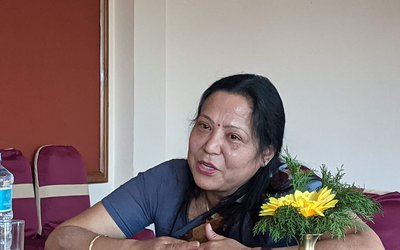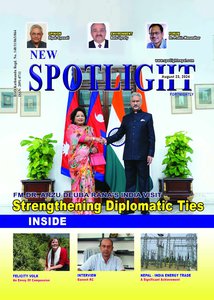
How is Gerda Hankel Stiftung supporting Nepal?
The Foundation has its headquarters in Düsseldorf, Germany. The Gerda Henkel Foundation was established in June 1976 by Lisa Maskell in memory of her mother Gerda Henkel as a private, non-profit grant making organization. The sole object of the Foundation is to promote science at universities and research institutes, primarily by supporting specific projects in the field of the humanities that have a specialist scope and are limited in time.
The Gerda Henkel Foundation concentrates its support on the historical humanities, mainly on history, archaeology, the history of art and other disciplines with a historical component. The Gerda Henkel Foundation is active both inside and outside Germany. It is a private foundation with its own endowment. Our mission is to support outstanding projects in cultural sides. We have done a few projects in the region including upper Mustang. I visited a project of renovation of Shiva Temple in Dhadhikot, Bhaktapur. We hope that over the next month we will be able to identify and support our Nepalese partners in other interesting sites where we can perhaps help in consecration and may be with some trainings and capacity building.
You are doing something in cooperation with Kathmandu University?
We are considering to do this in cooperation with Kathmandu University and with Susanne von der Heide’s Himal Asia Foundation. This is going to be very excellent partnership. Our main mission is that we want to be sure that the money we provide is actually used locally, not by German professors or local consultants. The project should be run by local community.
How did you support the project in Mustang?
We helped to preserve a temple in Mustang which was in danger of being swept by floods. The roof was damaged very badly. I was very much impressed by the project because it had a lot of local participation. We were very excited to see students, farmers and all kinds of people helping the project. It was really a joint local effort, together with some foreign experts. We did it five years ago.
This means the Foundation has come back in Nepal after the lapse of five years?
Yes, we are coming here after five years. Our foundation has already made financial commitments to renovate the temple. As I understand the partnership between professors of Kathmandu University and Susanne von der Heide’s foundation are currently identifying new projects which we can hopefully support later this year.
How do you see Nepal’s cultural and archeology sites?
It is really hard for me to comment on such issues as non-expert. Personally, I find a lot of sensitivity locally in the need to preserve such sites. People become much more aware about their cultural sites and their values. I think it is improving. I hope the government will also invest more in this area. The kinds of science here in Nepal are unique and it has worldwide recognition. What I can say is that it is going in a good way.
- NEA: Kul Man Ghising, A Cool Man
- Oct 28, 2024
- DASHAIN FESTIVAL : Festival of Unity
- Oct 04, 2024
- NEPAL-CANADA Bilateral Meeting
- Oct 04, 2024
- MIDDLE BHOTEKOSHI: Final Stage
- Sep 23, 2024
- UDIPUR SUBSTATION: Improve Quality Of Distribution
- Sep 19, 2024
















